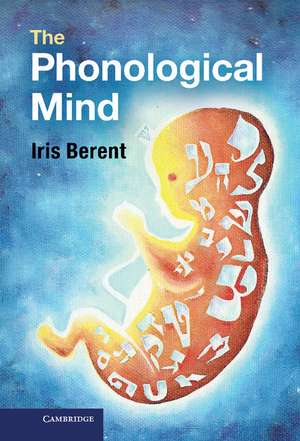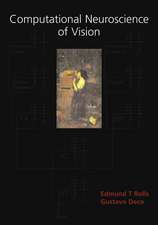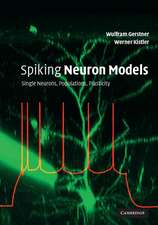The Phonological Mind
Autor Iris Berenten Limba Engleză Hardback – 9 ian 2013
| Toate formatele și edițiile | Preț | Express |
|---|---|---|
| Paperback (1) | 274.88 lei 6-8 săpt. | |
| Cambridge University Press – 9 ian 2013 | 274.88 lei 6-8 săpt. | |
| Hardback (1) | 623.78 lei 6-8 săpt. | |
| Cambridge University Press – 9 ian 2013 | 623.78 lei 6-8 săpt. |
Preț: 623.78 lei
Preț vechi: 700.89 lei
-11% Nou
Puncte Express: 936
Preț estimativ în valută:
119.37€ • 123.87$ • 99.78£
119.37€ • 123.87$ • 99.78£
Carte tipărită la comandă
Livrare economică 15-29 martie
Preluare comenzi: 021 569.72.76
Specificații
ISBN-13: 9780521769402
ISBN-10: 052176940X
Pagini: 378
Ilustrații: 30 b/w illus. 9 tables
Dimensiuni: 152 x 229 x 22 mm
Greutate: 0.73 kg
Ediția:New.
Editura: Cambridge University Press
Colecția Cambridge University Press
Locul publicării:Cambridge, United Kingdom
ISBN-10: 052176940X
Pagini: 378
Ilustrații: 30 b/w illus. 9 tables
Dimensiuni: 152 x 229 x 22 mm
Greutate: 0.73 kg
Ediția:New.
Editura: Cambridge University Press
Colecția Cambridge University Press
Locul publicării:Cambridge, United Kingdom
Cuprins
Part I. Introduction: 1. Genesis; 2. Instinctive phonology; 3. The anatomy of the phonological mind; Part II. Algebraic Phonology: 4. How are phonological categories represented: the role of equivalence classes; 5. How phonological patterns are assembled: the role of algebraic variables in phonology; Part III. Universal Design - Phonological Universals and their Role in Individual Grammars: 6. Phonological universals: typological evidence and grammatical explanations; 7. Phonological universals are mirrored in behavior: evidence from artificial language learning; 8. Phonological universals are core knowledge: evidence from sonority restrictions; Part IV. Ontogeny, Phylogeny, Phonological Hardware and Technology: 9. Out of the mouths of babes; 10. The phonological mind evolves; 11. The phonological brain; 12. Phonological technologies: reading and writing; 13. Conclusions, caveats, questions.
Recenzii
'Although research on sentence processing has long been informed by syntactic theory, there has been more of a disconnect between phonological theory and research on word/sub-word processing. No more! This monograph establishes firmly how phonological theory and theories of speech processing are intricately connected. With this book, Berent cements her position as a major contributor to the research on speech processing and phonological theory, and the interface between these two fields.' Andries W. Coetzee, University of Michigan
'The patterning of the sounds of language may be the most elegant system of human cognitive competence, yet this intricate beauty has not been appreciated by psychologists. The Phonological Mind will change that - it is a brilliant and fascinating analysis of how we produce and interpret sounds, which will give phonology its proper due as a major topic in cognitive science.' Steven Pinker, Harvard College Professor of Psychology, Harvard University, and author of The Language Instinct and The Stuff of Thought: Language as a Window into Human Nature
'This is an important book that does a major service to several fields. In the context of articulating her position on algebraic phonology as a core system of knowledge, Berent covers an enormous range of phenomena very relevant to linguists, psychologists, speech scientists, and neurobiologists. With engaging and thoughtfully chosen examples ranging from development to brain science, the reader is treated to a great example of linguistics as cognitive science. The book succeeds in developing a view that offers productive linking hypotheses between language research, psychology, and biology.' David Poeppel, New York University
'With the goal of demonstrating to a cognitive science audience that phonological patterns consist of abstract equivalence classes - whose members are treated in terms of across-the-board generalizations whether they are familiar or novel - Berent has formulated a compelling line of argumentation, both grand in scope and profound in empirical depth.' Andrew Nevins, University College London
'In this wonderful work, Iris Berent shows how phonology can provide great progress on the classic 'big questions' of cognitive science, progress delayed for decades by the theoretical and empirical limitations of syntax. Berent manages to bring together a remarkably diverse body of research, much of it her own, accessibly presenting a wealth of information and insight while conveying the tremendous excitement in the field at this point in time. An amazing achievement, this book is to be read and enjoyed by anyone with a deep curiosity about the fundamental nature and source of nature's biggest gift to our species: language.' Paul Smolensky, Krieger-Eisenhower Professor of Cognitive Science, Johns Hopkins University
'Iris Berent's book The Phonological Mind offers a clear and convincing dissenting voice in this debate, arguing forcefully on the basis of interesting arguments for a moderately nativist position in phonology, one which incorporates a great deal of insight acquired in the course of years by her and her collaborators' Marc van Oostendorp, Phonology
'The patterning of the sounds of language may be the most elegant system of human cognitive competence, yet this intricate beauty has not been appreciated by psychologists. The Phonological Mind will change that - it is a brilliant and fascinating analysis of how we produce and interpret sounds, which will give phonology its proper due as a major topic in cognitive science.' Steven Pinker, Harvard College Professor of Psychology, Harvard University, and author of The Language Instinct and The Stuff of Thought: Language as a Window into Human Nature
'This is an important book that does a major service to several fields. In the context of articulating her position on algebraic phonology as a core system of knowledge, Berent covers an enormous range of phenomena very relevant to linguists, psychologists, speech scientists, and neurobiologists. With engaging and thoughtfully chosen examples ranging from development to brain science, the reader is treated to a great example of linguistics as cognitive science. The book succeeds in developing a view that offers productive linking hypotheses between language research, psychology, and biology.' David Poeppel, New York University
'With the goal of demonstrating to a cognitive science audience that phonological patterns consist of abstract equivalence classes - whose members are treated in terms of across-the-board generalizations whether they are familiar or novel - Berent has formulated a compelling line of argumentation, both grand in scope and profound in empirical depth.' Andrew Nevins, University College London
'In this wonderful work, Iris Berent shows how phonology can provide great progress on the classic 'big questions' of cognitive science, progress delayed for decades by the theoretical and empirical limitations of syntax. Berent manages to bring together a remarkably diverse body of research, much of it her own, accessibly presenting a wealth of information and insight while conveying the tremendous excitement in the field at this point in time. An amazing achievement, this book is to be read and enjoyed by anyone with a deep curiosity about the fundamental nature and source of nature's biggest gift to our species: language.' Paul Smolensky, Krieger-Eisenhower Professor of Cognitive Science, Johns Hopkins University
'Iris Berent's book The Phonological Mind offers a clear and convincing dissenting voice in this debate, arguing forcefully on the basis of interesting arguments for a moderately nativist position in phonology, one which incorporates a great deal of insight acquired in the course of years by her and her collaborators' Marc van Oostendorp, Phonology
Notă biografică
Descriere
A study of how humans weave the sound-patterns of language, informed by insights from linguistics, cognitive science, neuroscience and genetics.











